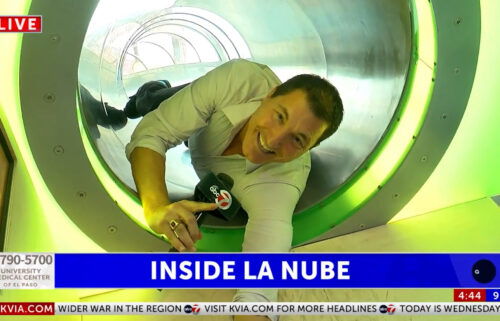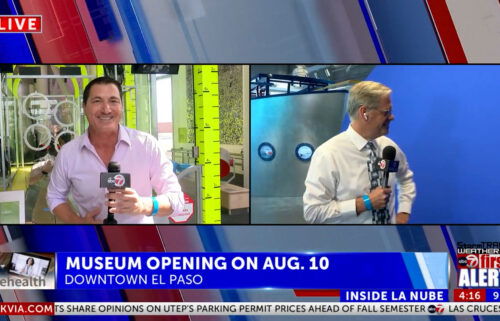Colorado backcountry rescue teams seeing tremendous uptick in calls
Click here for updates on this story
DENVER, CO (KCNC) — New snow over the weekend and into the week created some instability in Colorado’s backcountry. With crowds anticipated to pick up, search and rescue crews are training for every scenario.
“Based on our summer numbers which showed a 300% increase in rescues from 2019 to 2020, we’re thinking that this is going to be a busy winter, and we really want to be prepared for safe snow travel, safe avalanche travel and appropriate rescue skills to get people out of the snow,” said Taryn Barrette, Training Coordinator for Lake County Search and Rescue.
In addition to an increase in call volume, Lake County Search and Rescue (LCSAR) has seen an increase in the intensity of missions.
“Even just recently, we had some folks nearly just perish from hypothermia hiking up (Mount) Elbert in some jeans and sweatshirts, got caught in snowstorm,” said Barrette.
CBS4 spent the day with LCSAR near Independence pass as the team was training for avalanche rescues.
“There’s been a huge increase in people recreating in the mountains. I think just people wanting to travel to the mountains because they can’t get on an airplane, and a huge number of people who have enrolled in avalanche safety classes,” she said.
While the increases in courses isn’t all bad, it’s an indication that more novice backcountry users are interested in the sport. Barrette hopes this means people will take the time to continue to learn instead of going straight for the summit.
“Be prepared in terms of understanding the terrain, understanding avalanche danger, and always letting somebody know where you’re going and when you expect to be back. If it seems unsafe, turn around. Turn around. It’s okay, you can come back tomorrow. You don’t have to summit today.”
As much planning is expected of those recreating in the backcountry, LCSAR does even more. From altitude sickness to avalanche burials, they need to know how to respond to all of it.
“There’s just been an increase in more trauma. People slipping and falling, maybe just aren’t in shape or aren’t used to traveling or recreating in the Rockies. A lot of altitude issues so people who are just kind of unprepared for coming from much lower elevation, and just rapidly traveling up to Lake County and then rapidly ascending a 14,000-foot peak, and what that can do to your body.”
Jonathan Burk, a paramedic and search and rescue member led the recent training with LCSAR. They were focused primarily on avalanche burials involving more than one person. This year, he anticipates the SAR team will have to respond to more incidents like this.
“At some point with the anticipated high volume of backcountry users this year, we’re training as if, to expect a lot,” said Burk.
During the Saturday training, Burk went through multiple variations of beacon searching. From working out the kinks in individual models of beacons to a full-on triple-burial scenario where the team had to trek into a slide path, interact with a witness to the mock avalanche, and find all three victims in a timely manner.
“What if he’d been buried for 60 min or longer?” Barrette asked the group. “Yeah, then the hypothermia thing comes into play.”
Barrette, along with the rest of the volunteers, are constantly learning about what makes the difference between survival and death in a victim.
Unfortunately, on Saturday, one of the mock buried victims, a mannequin, had severe trauma. It was short an arm likely due to consistent use, but the group still rolled with the punches.
“Pulselessness due to trauma,” Barrette announced after going for a defibrillator.
All members of Colorado’s search and rescue groups are volunteer. Like Burk, Barrette also works in the medical field full-time.
“Obviously, we love doing it which is why we volunteer to be on the SAR team and why we keep responding to calls. So, you know, it’s rewarding for sure, but definitely exhausting!”
She hopes others take recreating in the backcountry as seriously as SAR takes training for rescues.
“Even if you have the skills the weather can change on you, the terrain can change on you. There’s just so many different factors that can change,” she continued. “The most important thing that search and rescue teams can do is just really reinforce how important it is to be prepared when you’re traveling.”
Search and rescue groups in Colorado are in line to receive COVID-19 vaccinations this winter. They will follow the 1a group, which is reserved for high-risk first responders, who interact with COVID-19 patients on a regular basis.
The state has dedicated the next few months to winter backcountry safety awareness. It launched a campaign just last week, asking those who plan to recreate in the backcountry to take a pledge to do so responsibly.
Please note: This content carries a strict local market embargo. If you share the same market as the contributor of this article, you may not use it on any platform.




